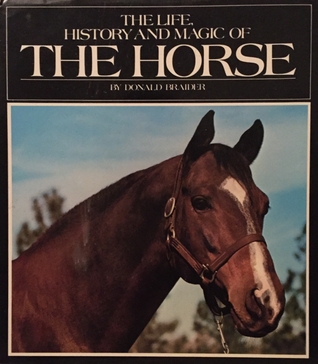

 |

|

The average rating for Life, History and Magic of the Horse - Donald Braider - Hardcover based on 2 reviews is 3 stars.
Review # 1 was written on 2014-09-26 00:00:00 Mark Singer Mark SingerThose Pullman Blues: An Oral History of the African American Railroad Attendant by David D. Perata is a book that offers many insights into the experiences of African American men who worked on the railroad. Perata worked for Amtrak in the 1980s and met people and then did oral histories with many who had retired and some who were still working. Eight oral histories are featured in the book. Perata does provide some information for the historical context. Because his focus was the west coast, we get a different perspective on the work than other treatments. Perata is quoted in the Theodore Kornweibel Jr. book on the Railroads in the African American Experience: A Photographic Journey. The shift to west coast is important, since some of the men who were born and even raised in the South began their work on the west coast. Perata worked for Amtrak in the 1980s and made connections. These men were attendants, but also worked in the kitchen, they might have started at cook fours, meaning dishwashers, but advanced to higher level cooks and even chefs. Knowing the changes that Kornweibel tracks, helps the follow the narratives. Young men, even boys, worked on the railroad and stayed with railroad lines for decades. Because the oral histories in this book were western based, the men did not face Jim Crow segregation until they crossed state lines. It was complicated with trains having to make many adjustments. Picking up Jim Crow cars and dropping them off, as Black men and women shared space with White passengers. However, it also meant variations in treatment. Yet, the stories also track the changes in technology and the shape of the industry as they last oral history involves a man looking for work at Southern Pacific who is told that they are not hiring but Amtrak is hiring—so he works for Amtrak. The men were cognizant of their status as servants, but their stories tell a complicate tale of negotiating in the workplace. They were survivors. Perata is aware of the stereotypes, but he can also describe the ways that these men pushed the boundaries. They looked, listen, and learned, which help them build careers in a time when the options for Black men were limited. Given their low wages, they were in the late 19th and early 20th century, they were dependent on tips, and took abuse to gain those tips. Job segregation was part of the legacy of the railroad. There were clear color lines in the work that people could do, but wars, including federal government rules, and the movement of White men into other industries, did create opportunities for Black men in jobs that had been designated as “White.” We learn about how the business men at the top, thinking about earnings, recognized the talents of Black men and sent them into unfriendly territory as they had to teach people, many White men, about the new technology as propane gas was introduced in kitchens, rather than wood and coal burning stoves. Many of these men did not challenge the racism they met, but pushed it aside and did their work and many were recognized for their contributions. It is clear, that these men learned to negotiate the system. Many worked in private cars, given their seniority and skills served major leaders and Hollywood stars. In many cases, family members followed in the steps of kin. Yet, Perata is clear on how the time away from family, as men were sent on long journeys at the will of others, had personal costs. Their jobs as chefs and porters gave them new opportunities, some of which the men shared with their own families, as they traveled to the World Fair in St. Louis and other excursions. Carrington, the final history, worked for Amtrak, but learned the history of work from many who had been in railroad jobs a long time. He recognized the “servant” part of the work, but to his children “he worked for the railroad.” There is a complex history here, as people often took advantage of the only opportunities open to them at the time, even with the cost of time away from family. But they understood the limitation of the work and what it meant to White people to be “served,” yet they had their own definitions and goals. The legacy of Pullman Porters, dining car waiters, cooks and chefs on the railroad is important in documenting the resiliency of people in the face of oppression. |
Review # 2 was written on 2010-04-06 00:00:00 Shawn Hicks Shawn HicksI think I'm getting hooked on oral history. You wouldn't think books on building the Hoover Dam or Pullman trains would be interesting but they really are. Now I have a long list of used books in that style to buy from Amazon. C'est la vie. |
CAN'T FIND WHAT YOU'RE LOOKING FOR? CLICK HERE!!!